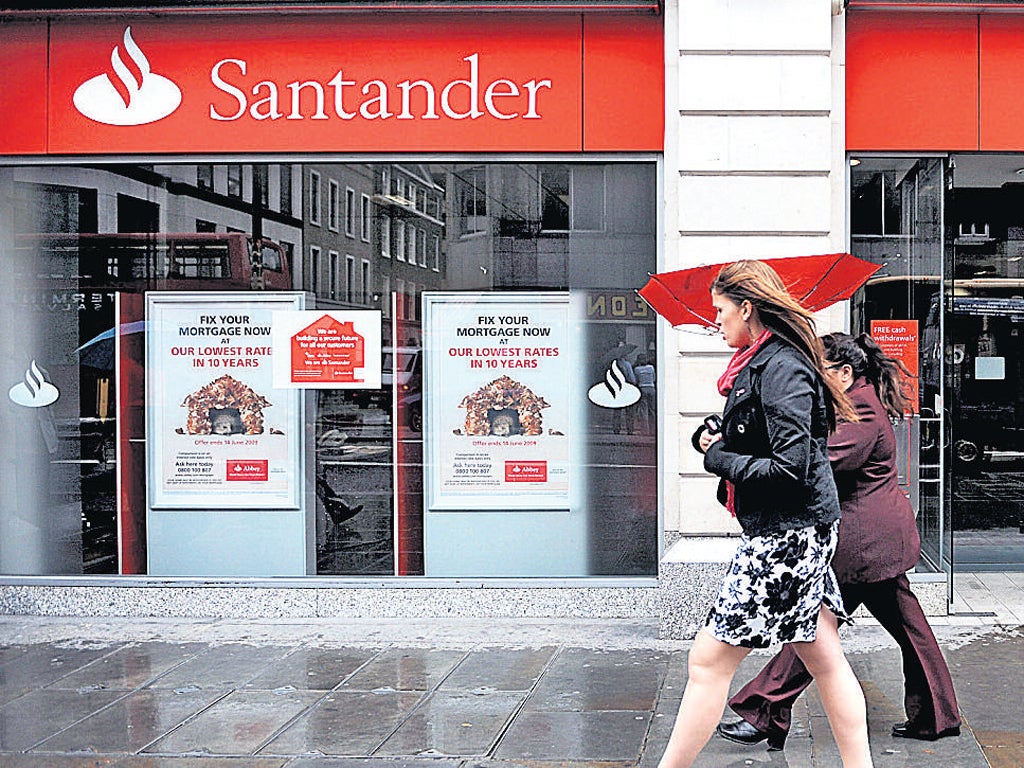Santander increase will mean rise in cost of banking
Millions will be charged twice as much for going into the red.

Your support helps us to tell the story
From reproductive rights to climate change to Big Tech, The Independent is on the ground when the story is developing. Whether it's investigating the financials of Elon Musk's pro-Trump PAC or producing our latest documentary, 'The A Word', which shines a light on the American women fighting for reproductive rights, we know how important it is to parse out the facts from the messaging.
At such a critical moment in US history, we need reporters on the ground. Your donation allows us to keep sending journalists to speak to both sides of the story.
The Independent is trusted by Americans across the entire political spectrum. And unlike many other quality news outlets, we choose not to lock Americans out of our reporting and analysis with paywalls. We believe quality journalism should be available to everyone, paid for by those who can afford it.
Your support makes all the difference.Spanish-owned bank Santander is doubling the daily charge for customers who go into the red.
From 16 March, anyone who slips into an unauthorised overdraft will be hit by a daily charge of £1, rather than the existing 50p.
The move will encourage rivals to take another look at their own fees and could lead to an increase in current account fees across the market.
"The concern is that the doubling of overdraft fees from Santander will trigger a new round of similar increases from its high street rivals," said Andrew Hagger of Moneynet.
He pointed out that Halifax already charges £1 per day or £2 per day for authorised overdrafts over £2,500.
Santander said it's simply matching the price of its rivals, but the fee is expensive. It also strengthens the argument that overdraft charges are too complicated.
For instance, First Direct doesn't have a fixed fee but charges interest of 15.9 per cent. That may sound a lot more expensive than Santander's new rate but it could work out a lot cheaper. Anyone with a £500 overdraft for instance, will only end up being charged 22p a day at First Direct, less than a quarter of the new charge at Santander.
Mr Hagger said the Spanish bank's new deal actually works out at an interest rate of 73 per cent for anyone going £500 into the red and being charged £1 a day.
"Although the tariff for each individual bank or building society may be clear, because of the varying combinations of monthly fees, daily fees and interest rates used across the industry, it is impossible to work out which is the best account," he said.
Indeed, that was proved this week by research from consumer group Which?. It asked volunteers – including a maths PhD student – to calculate the charges of an unauthorised overdraft for four different banks.
The volunteers were only able to get seven out of 48 charges correct, prompting Which? chief executive, Peter Vicary-Smith, to say: "Bank charges are too complex and impossible to compare."
Santander says its new deal is "designed to support its customers in managing their money". It has introduced a £12 buffer so people won't get massive charges if they slip £12 or less into the red. There is also a 4pm deadline allowing people to avoid charges if they put accounts right on the day they get overdrawn.
But rival banks already offer better deals. The 1st Account from First Direct offers a £250 overdraft interest free, while Coventry building society offers a similar deal.
However, choose the wrong bank account and overdraft charges can be staggering. The highest current account unauthorised overdraft fee – at £150 a month – is charged by First Direct and HSBC. The same overdraft and account usage at Barclays would attract charges of £66.
Many banks also use expensive daily fees which produce outrageously high APRs. RBS, for example, charges £6 a day, equivalent to an APR of 2,190 per cent, said Which?.
Join our commenting forum
Join thought-provoking conversations, follow other Independent readers and see their replies
Comments